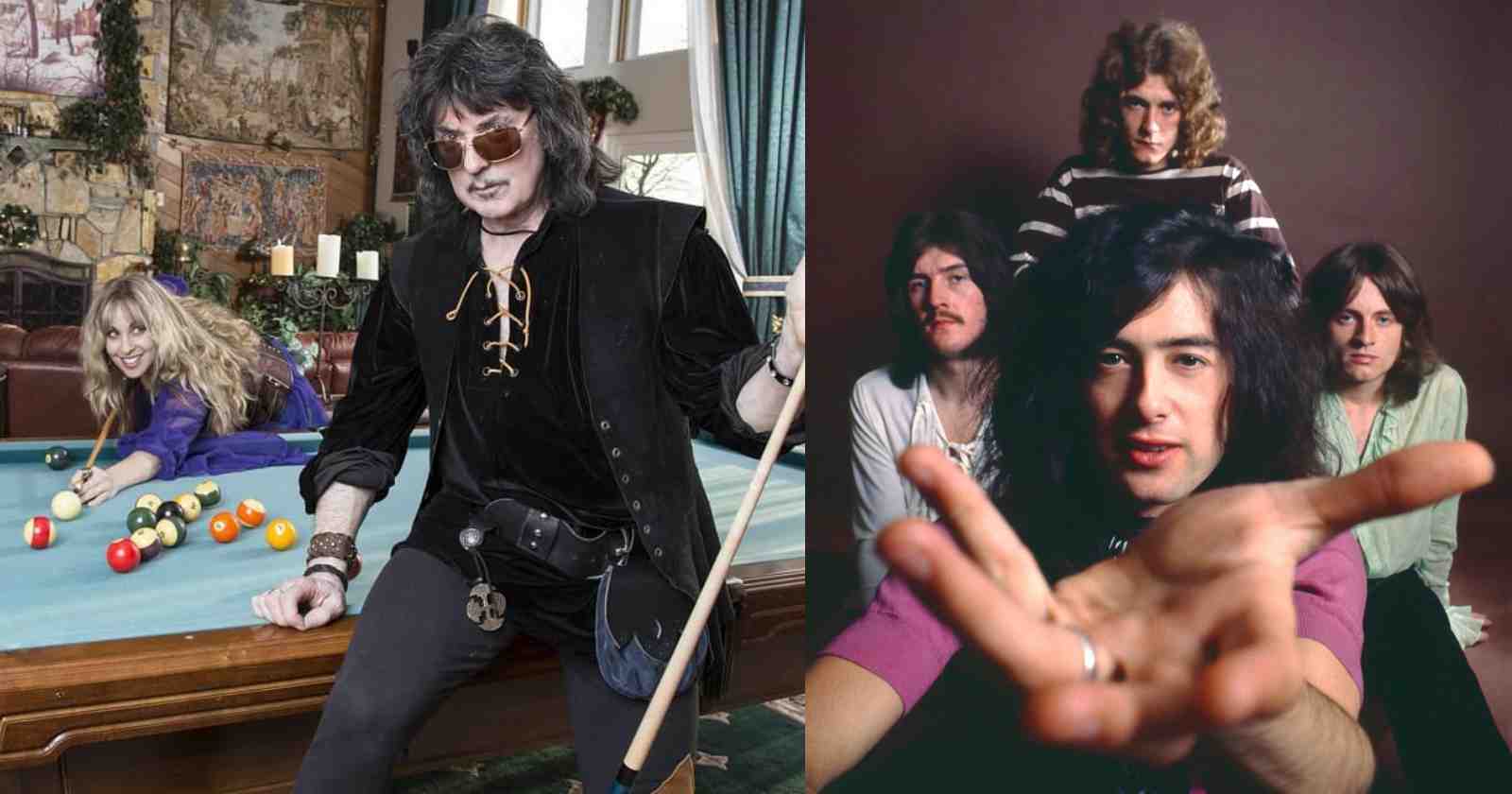ARTICLES
Ritchie Blackmore’s opinion on Led Zeppelin
Ritchie Blackmore is one of the most influential guitarists of all time that made history as a member of Deep Purple and his own band Rainbow. He had created some of the biggest guitar riffs and solos from Hard Rock music and was an inspiration for countless musicians over the decades.
Advertisement
Blackmore is also known for being a sincere person that always gave his real opinion on other artists. He talked about many of his contemporaries during his career and one those bands is Led Zeppelin.
What is Ritchie Blackmore’s opinion on Led Zeppelin
As Ritchie Blackmore recalled in an interview for the documentary “Ritchie Blackmore Story” from 2015 (Transcribed by Rock and Roll Garage), he met the guitarist Jimmy Page years before Led Zeppelin was founded and when both of them were still teenagers. It was in 1962, when Blackmore saw Page for the first time when he was part of a band called Neil Christian and The Crusaders.
The two guitar players were coincidentally from the same area in England. Years later, Blackmore would recognize that Led Zeppelin was the reason why Deep Purple changed their sound in the early 70s.
“It is strange how we all come from the same area. Like I said, with Jimmy Page, he was in the same village, it’s like a village. Really not even a town. Clapton was a few more warm miles out and course (Jeff) Beck was in another area, but course, the same age.”
“I knew that he was going to be somebody then. Not only he was a good guitar player, he had that star quality there. There was something about him, he was very poised and confident. He was confident but not arrogant. So I thought ‘he’s gonna go somewhere’ that guy, you know. He knows what he is doing.”
Ritchie Blackmore continued:
“He was way ahead most guitar players. He was really good, he knew he was good too. (Also), he wasn’t arrogant but he was very comfortable within himself. Then 64 or 65, I met up with him, we did a couple of sessions actually with him. One was with Jeff Beck. Jeff took the solo and everybody was raving about the solo, that was a really good solo.”
“I noticed I was playing and he was looking at my hands. I’m like ‘why you are looking at my hands?’ and he responded ‘I don’t know where we are. I’m just following your chords’, Ritchie Blackmore said.
It was Led Zeppelin that inspired Ritchie Blackmore to change the sound of Deep Purple
The first three Deep Purple albums were much more focused on the Psychedelic Rock sound, that was often built around Jon Lord’s keyboards but that changed on their fourth album “Deep Purple In Rock” released in 1970, that had embraced the Hard Rock. As Ritchie Blackmore revealed in an interview with Classic Rock magazine in 1995, Led Zeppelin was the inspiration for that change.
“I was impressed with what Zeppelin did. I wanted to do that kind of stuff, and if it doesn’t take off we’ll go and play with orchestras the rest of our lives. So we did it, and it was ‘Deep Purple In Rock’, which, luckily, took off. We’d purposely made it so it hammered along every song, there was no lull. I was very pleased with it because I never wanted to work with an orchestra again,” Ritchie Blackmore said.
In 1978, when Blackmore had already left Deep Purple for the first time and was with his own band Rainbow, he had recognized in an interview with Trouser Press the influence of Led Zeppelin. But he also stated that that style from Jimmy Page, John Paul Jones, Robert Plant and John Bonham came from Jeff Beck and The Small Faces.
“Zeppelin. I liked their hard approach when they came out and did ‘Whole Lotta Love’. I immediately tuned in with that type of style because before when we were fiddling around with orchestras, I thought: something’s wrong; I’m not giving all that I can. Thanks to them for the inspiration. They got it from Jeff Beck, who got it from the Small Faces,” Ritchie Blackmore said.
Ritchie Blackmore once criticized Led Zeppelin to the late drummer John Bonham
During his career, Ritchie Blackmore had the chance to meet the Led Zeppelin members, especially the late drummer John Bonham, who was a dear friend. As the guitarist recalled in an interview with Neil Jeffries back in 1995, he once confronted Bonham when they were drinking at the Rainbow Bar & Grill in Los Angeles.
They were both drunk and Bonham decided to make a joke about Blackmore’s guitar playing, so the guitar player did the same, telling the drummer that Zeppelin “stole” many of their songs.
“I used to be very friendly with Bonzo from Led Zeppelin. We’d be sitting drinking in the Rainbow. He’d be really up and drunk or really depressed. So he’d be looking at the table. He used to say to me: ‘It must be really hard to stand there and go: ’der-der-derr, der-der, de-derr’ (Smoke on The Water guitar riff)”.
Blackmore the replied, saying: “‘Yeah, it’s nearly as difficult as going: ‘duh-der duh-der dum’ (‘Whole Lotta Love’ guitar riff). At least we don’t copy anybody!’ He goes: ‘What are you talking about? That’s bullshit!”
“I know exactly where you got “duh-der duh-der dum” from. You got it from ‘Hey Joe’, you just put it to a rhythm.’ And he’s thinking. ‘And ‘Immigrant Song’ was ‘Little Miss Lover.’ ‘What are you talking about?’ ‘Bom-bobba-didom ba-bom bobbadidom…’ He was not a happy man. But he started it.”
Ritchie Blackmore continued:
“We then went upstairs to the toilet. We’re both there, weeing away, and he says: ‘Rich, did you mean all that?’ I said: ‘No, not really. I was just having a go back at you.’ He says: ‘Oh. I didn’t mean it either. There’s room at the top for everybody.’ So we carried on weeing, then went downstairs and started drinking again.”
“But he loved it. He was the kind of guy who liked confrontation. I would always give it to him. But I always remember when he said how we’d taken bits and pieces from people. So I told him where he got his stuff from. It was interesting to see how his mind was going: ‘Pagey, you bastard. Now I know!’” Ritchie Blackmore said.
He once said that Zeppelin helped to define the term “Sophisticated Rock”
The first Led Zeppelin album was released in 1969, when the band members were still in their 20s: Jimmy Page (25), John Paul Jones (23), Robert Plant (20) and John Bonham (20). But even though the four musicians were still quite young, they already had a lot of experience, especially Paul Jones and Page who were already praised session musicians.
Those years of session recordings with other famous artists gave them a lot of experience to know what to do when they did their first record. It’s not a coincidence that it was Jimmy Page, who produced that debut album with all the knowledge he had from the previous sessions and from his work with The Yardbirds.
He ended up producing all the 8 Led Zeppelin albums and the compilation record “Coda” (1982). That discography had a huge impact in the way that Rock and Roll bands recorded their albums and Blackmore agreed in a conversation with Kerrang! magazine in 1984 that Zeppelin helped to sophisticate Rock music.
“I think Van Halen are interesting. I don’t particularly like them as a band. But there is a lot of movement, a lot of colour to the material they produce. Led Zeppelin too, now they probably defined the term ‘sophisticated rock’. Things like ‘Kashmir’, the certain, the certain scales they would hit… that was incredible,” Ritchie Blackmore said.










